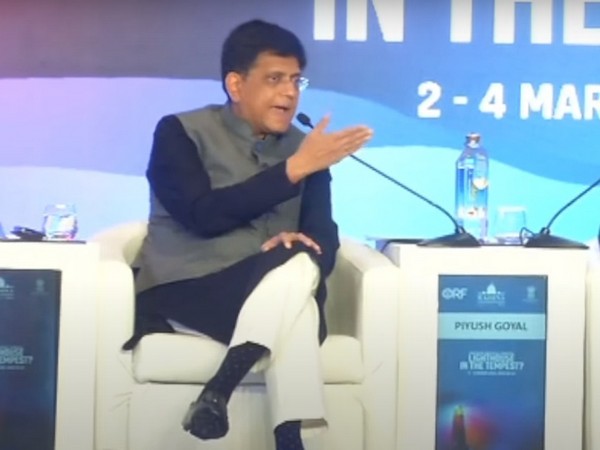
New Delhi: Union Minister of Commerce and Industry Piyush Goyal said that the export figure for last year already crossed in February and expressed confidence that merchandise and services exports would touch $750 billion this year. He was addressing the 8th edition of the Raisina Dialogue in New Delhi on Saturday.
The Union minister said, "India is targeting annual export of a trillion dollars of goods and a trillion dollars of services by 2030." Responding to a question on India achieving the highest export figure in the past year, the Minister said that it was the result of a deep-dive analysis and extensive planning where India's capabilities were thoroughly assessed, new markets were sought out, districts, especially remote ones were empowered to become export hubs and all Indian Missions abroad were effectively leveraged to promote trade, technology and tourism. The Minister noted that last year, merchandise and service trade had crossed $650 billion.
Goyal said that India would soon touch the mark of being a $5 trillion economy and said that it would emerge as the third-largest economy in the world by 2027-28. By 2047, India will be a developed economy with a $32 trillion economy, a prosperous economy where every last citizen would have access to a good quality life, he said and added that if the nation came together as one, India could even dream of building a $40 trillion economy by 2047.
Goyal opined that the transformational initiatives undertaken by the government over the last decade, such as the Swachh Bharat Mission, electrification of around 35 million homes in rural India, creation of a robust power grid, housing for all, free healthcare for over 500 million people had held India in good stead to overcome the challenges posed by the pandemic. He lauded Prime Minister Narendra Modi's decisive leadership and said that all through the pandemic PM Modi constantly sought ideas not only to overcome the pandemic but to transform the challenges it posed into opportunities.
Responding to a query on global uncertainty caused due to conflict, Goyal said that these turbulent times had given India an opportunity to showcase its resilience.
He explained that food security had emerged as a serious challenge before the world and said that PM Modi had the foresight to plan ahead to fortify India's food security by ensuring an adequate supply of fertilizers.
Speaking of the time when fertiliser prices hit the roof, Goyal said that PM Modi had ensured that farmers, especially small and marginal farmers did not take a hit by taking the burden of the increased prices on the central government. "India is self-sufficient on food security, and we will continue to produce at greater levels than last year so that we can support some of our neighbours and other friendly nations," he said.
The Minister stressed that the government had been creating an enabling environment to attract investment into India. He highlighted that India was a nation of 1.4 billion people who are both youthful and aspirational with excellent skills, including managerial skills. He observed that the government had been successful in meeting the basic requirement of life of the people, liberating them from he struggled to secure the basic amenities of life, thereby empowering them to aspire for better things in life.
These enhanced aspiration levels, the Minister said, presented a huge market opportunity to investors, in addition to sharpening India's competitive edge in the world market due to the willingness people have to work harder and contribute more to India's growth story. "Government has focused on greater Ease of Doing Business, reducing compliance burden, decriminalising laws, implementing PLI scheme in critical sectors, digitising the economy promoting Startups. The world will not get a better friend and trusted partner like India," he noted.
The Minister responded to a query on semiconductors and said that many companies were already in dialogue for investing in India in the semi-conductor chain because of the India's stability and investor-friendly business ecosystem.
Demystifying the reasons behind India's trade deficit and import reliance, the Minister stressed that with the high levels of investments coming into manufacturing in India, India had been succeeding in producing high-quality goods and services at competitive prices, rapidly reducing reliance on imports.
He underscored that the government was focusing extensively on bringing in quality consciousness through various initiatives such as Quality Control Orders (QCOs).
The Minister also mentioned that the number of QCOs had grown by over four times and stands at about 440 products now and in the next two years, it would grow up to 2000 helping achieve India's aspiration of achieving 'Zero Defect, Zero Affect'.
The Minister spoke of India's sustainability thrust and said that since time immemorial, respect for nature was deep rooted in India's civilizational ethos. 'Sustainability and quality are the two factors that will hold India in good stead in the times to come', he added.